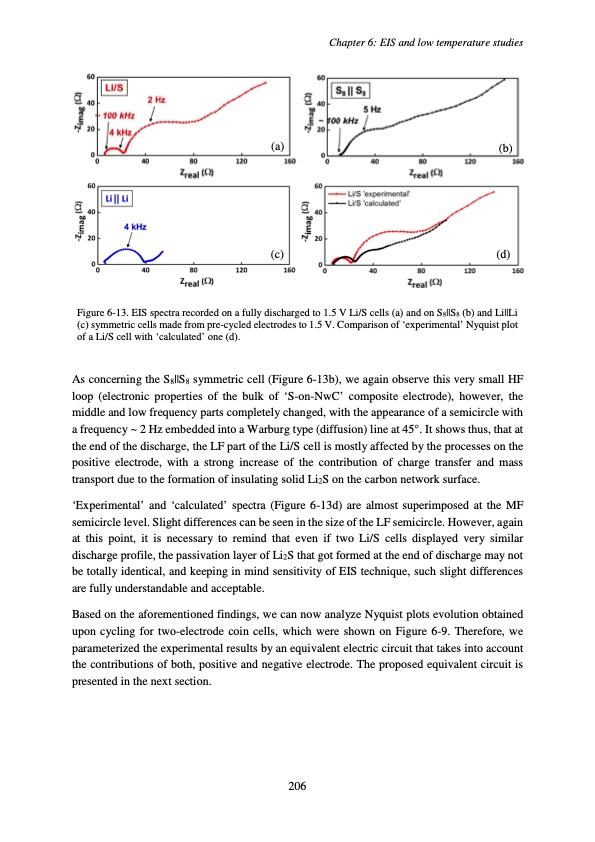
PDF Publication Title:
Text from PDF Page: 210
Chapter 6: EIS and low temperature studies (a) (b) (c) (d) Figure 6-13. EIS spectra recorded on a fully discharged to 1.5 V Li/S cells (a) and on S8||S8 (b) and Li||Li (c) symmetric cells made from pre-cycled electrodes to 1.5 V. Comparison of ‘experimental’ Nyquist plot of a Li/S cell with ‘calculated’ one (d). As concerning the S8||S8 symmetric cell (Figure 6-13b), we again observe this very small HF loop (electronic properties of the bulk of ‘S-on-NwC’ composite electrode), however, the middle and low frequency parts completely changed, with the appearance of a semicircle with a frequency ~ 2 Hz embedded into a Warburg type (diffusion) line at 45°. It shows thus, that at the end of the discharge, the LF part of the Li/S cell is mostly affected by the processes on the positive electrode, with a strong increase of the contribution of charge transfer and mass transport due to the formation of insulating solid Li2S on the carbon network surface. ‘Experimental’ and ‘calculated’ spectra (Figure 6-13d) are almost superimposed at the MF semicircle level. Slight differences can be seen in the size of the LF semicircle. However, again at this point, it is necessary to remind that even if two Li/S cells displayed very similar discharge profile, the passivation layer of Li2S that got formed at the end of discharge may not be totally identical, and keeping in mind sensitivity of EIS technique, such slight differences are fully understandable and acceptable. Based on the aforementioned findings, we can now analyze Nyquist plots evolution obtained upon cycling for two-electrode coin cells, which were shown on Figure 6-9. Therefore, we parameterized the experimental results by an equivalent electric circuit that takes into account the contributions of both, positive and negative electrode. The proposed equivalent circuit is presented in the next section. 206PDF Image | Accumulateur Lithium Soufre

PDF Search Title:
Accumulateur Lithium SoufreOriginal File Name Searched:
WALUS_2015_archivage.pdfDIY PDF Search: Google It | Yahoo | Bing
Sulfur Deposition on Carbon Nanofibers using Supercritical CO2 Sulfur Deposition on Carbon Nanofibers using Supercritical CO2. Gamma sulfur also known as mother of pearl sulfur and nacreous sulfur... More Info
CO2 Organic Rankine Cycle Experimenter Platform The supercritical CO2 phase change system is both a heat pump and organic rankine cycle which can be used for those purposes and as a supercritical extractor for advanced subcritical and supercritical extraction technology. Uses include producing nanoparticles, precious metal CO2 extraction, lithium battery recycling, and other applications... More Info
| CONTACT TEL: 608-238-6001 Email: greg@infinityturbine.com | RSS | AMP |